An Introduction to China’s Top 10 Wineries
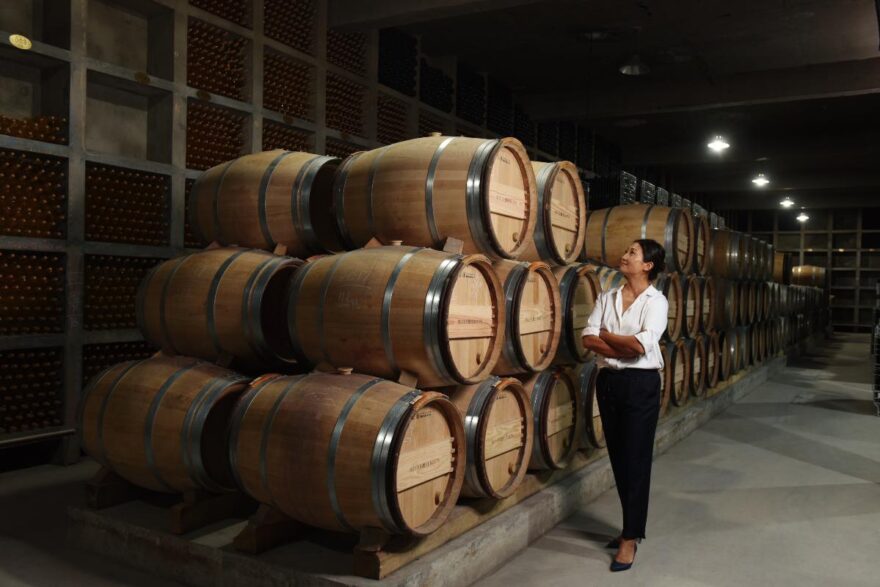

Within the region of China that lies between the northern latitudes of 45° and 25°, you will find a number of unique wineries that have become a hotbed for both Chinese and foreign investors.
Below, we provide you with an introduction to several of these wineries, along with information about their major products which have gained praise and acclaim in international markets.
Silver Heights Vineyard
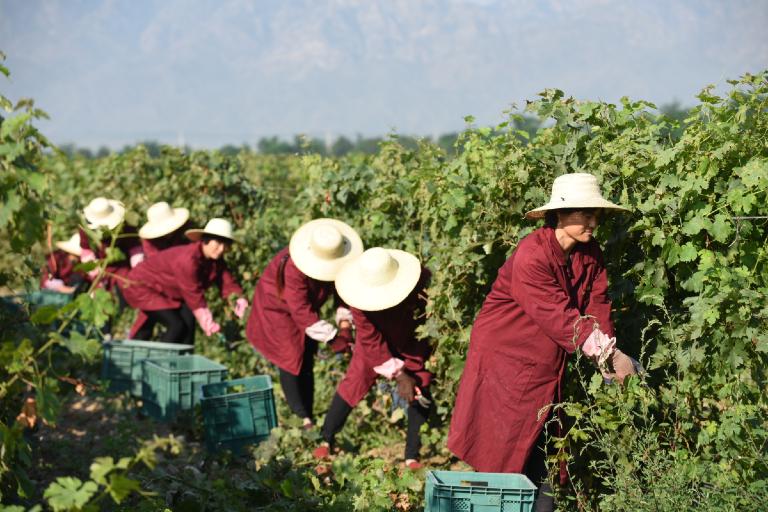
Location: East foothills of the Helan Mountains at an altitude of 1200 meters, on the Aiyi Riverside along Helan Mountain Road, within the forest management area of Yinfeng Village, Yinchuan, Ningxia Hui Autonomous Region
The Helan Mountains in Ningxia, where the Silver Heights Vineyard is located, lie at the same latitude as the world-renowned wine regions of Bordeaux, France, and Napa Valley, California. Silver Heights also has the distinction of being one of China’s highest wineries, with an altitude of 1200 meters. This region meets all of the climatic requirements for growing top-quality wine grapes: the soil in the region has a gravelly quality that is extremely suitable for wine grape cultivation; the region’s climate is dry, as it lies within the moderate temperate zone where there are little rain and abundant sunlight; and the temperature range between night and day is large. Compared to the temperate wet climates of Bordeaux and Napa Valley, the grapes grown in Ningxia actually have a stronger and richer aroma when ripened.
On June 12, 2016, when President Li Keqiang entertained German President Angela Merkel with a feast at the Summer Palace, the wines selected for the meal were the Silver Heights Summit Red and Family Reserve Chardonnay.
Grace Vineyard
Location: Dongjiacun, Ren Village, Taigu District, Shanxi Province
Whether you consider its packaging, its brand operations, or its craftsmanship in the wine-making process, Grace Vineyard is the Chinese winery that best meets international standards. Grace Vineyard has a distinctive style, and its location provides a rich natural environment for the cultivation of wine grapes. Only traditional Bordeaux grape varieties are grown at Grace Vineyard, and production amounts are strictly controlled; they are only brought to market after being aged in American or French oak barrels.
After 20 years of operation, Grace Vineyard has already become the model winery of China’s North-Central region, but it still continues to innovate – it has even brought a fresh, Chinese perspective to the Italian grape variety Aglianico. Today, its flagship products “Chairman’s Reserve” and “Deep Blue” are sold in countries such as England and Singapore. Its sparkling wine is deserving of a special recommendation; with a light and pure, fruity body, it is very suitable for the youth market and has also received the White Gold Award, a high honor from the Decanter Asia Wine Awards.
Chateau Sun God Great Wall
Location: East Dongshuiquancun, Shacheng, Huailai County, Zhangjiakou, Hebei Province
Chateau Sun God Great Wall was established in 1979, serving as the national research base selected by the Five Ministries in 1978, as well as the birthplace of dry wine in China.
Located on the beautiful Sanggan riverside, along the same vein as the Forbidden City in Beijing, it has become known as the “Vineyard on the Dragon’s Back.” The 2 million years of fossils packed into the region’s soil have produced great conditions for 30-year grape cultivation, and the region also enjoys the perfect amounts of both sunlight and rain. The unique climatic conditions of the Sanggan River have made the wines of Chateau Sun God Great Wall a model of firm yet elegant styling.
From the time the winery was founded in 1979 through the present, Chateau Sun God Great Wall has consistently maintained its place as having its wine chosen for use in state banquets. Every year, the winery carefully selects grapes of the highest quality grown from its nearly 75 hectares of rich riverside soil, fermenting them with the utmost care in order to produce a special edition, limited quantity wine for exclusive use in national banquets or as a “national gift” to distinguished guests from around the world.
Helan Qingxue Vineyard
Location: Building 1, Yinchuan Gaoxin District, Ningxia Hui Autonomous Region
The Helan Qingxue Vineyard grows 16 wine grape varieties which have been introduced from France, and with a land area of around 13 hectares and over 1,000 square meters of underground cellar space, it marks a yearly production of 50,000 bottles of wine. Beginning in 2005, the meticulously produced Jiabeilan Dry Red has received awards at numerous wine competitions, both domestic and international. One ceremony of special note is the 2011 Decanter World Wine Awards, where its “Jiabeilan” 2009 vintage wine received top honors as recipient of the International Special Award, becoming the first Chinese wine to win a top international award.
The Helan Qingxue Vineyard shows a great respect for nature throughout its production process, and strictly abides by the principle that “good wine is grown.” Adopting traditional French craftsmanship, it ages and stores its wine in French oak barrels, and the resulting wines present a deep ruby red coloring and a rich aroma that is refined and noble, and a texture like an extension of happiness. The smooth and full body of the wine serves as a manifestation of the characteristics of the eastern foothills of the Helan Mountains.
Today, the wines produced by the Helan Qingxue Vineyard are primarily sold in England and Singapore, but the vineyard hopes to expand sales throughout the rest of Europe by utilizing online retail.
Kanaan Winery
Location: West Beijing Road, Yinchuan Xixia District, Ningxia Hui Autonomous Region
Canaan is the birthplace of the Israeli people, and in the Old Testament of the Bible it is called “the land of milk and honey,” and “the Promised Land.”
The Kanaan Winery is located on the eastern foothills of the Helan Mountains, in a semi-arid continental climate with long days and a relatively high-temperature range between day and night. Its 18+ hectares of grape vines grow in a light grey calcium-rich soil, with the primary varieties being Cabernet Sauvignon, Merlot, Chardonnay, and Riesling. The winery uses a complete set of imported Italian fermentation equipment, ages its wine in oak barrels from various regions in France, and invites fermentation experts from China and Germany to lead the winemaking process.
In just a few short years, the winery has begun to receive praise from around the world, with its Chardonnay and Cabernet Sauvignon having received recommendations from Jancis Robinson and other wine experts. At the 2015 Decanter Asia Wine Awards, its Pretty Pony 2013 vintage was the ultimate winner of the Asia Red Regional Trophy.
Chateau Changyu AFIP Global
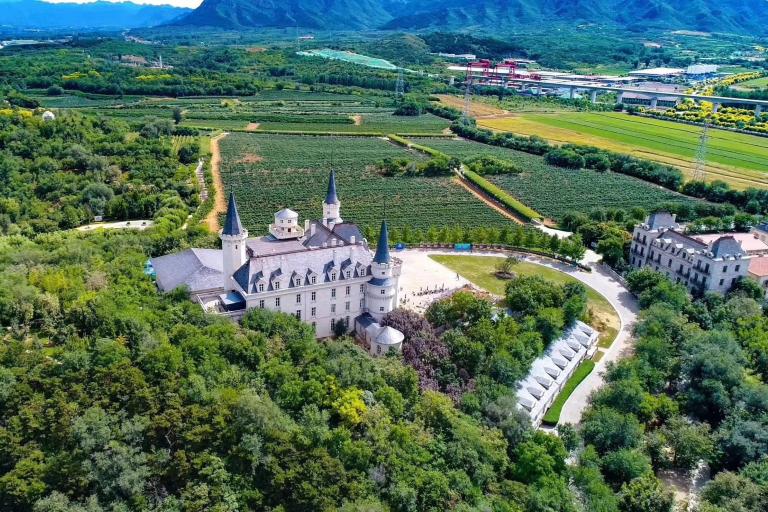
Location: Juge Village, Miyun District, Beijing
Chateau Changyu AFIP Global is located in the Miyun District of Beijing and was established by the Changyu Group with capital from France, the United States, Italy, Portugal, and other countries.
Chateau Changyu AFIP Global enjoys beautiful natural surroundings that are also advantageous to the cultivation of wine grapes. Its grapes are grown on a rich layer of tufa and calcium blend soil. The mountainous topography surrounding the vineyards provides the region with increased drainage, and the loose quality of the soil gives it relatively good ventilation, helping the grapes’ roots systems to spread. The roots penetrate over five meters into the earth, guaranteeing that the grapes are able to absorb all the nutrients they need from deeper within the layer of soil. The region belongs to the cold continental climate, and receives large amounts of sunlight, a large temperature range between night and day, and little to no rainfall in the month prior to the grapes’ full ripening, all of which provide a boost to the growth and sugar content of the grapes.
In addition, Chateau Changyu AFIP Global has attained a 4A tourist attraction rating and has become a five-star spot for leisurely agricultural and rural tourism as well as the base for popular science education in Beijing. This winery has also established an ecological agriculture development company, an industrial wine company, a tourism and culture company, and an international meeting center, and now offers a truly comprehensive experience for grape cultivation and fermentation, wine-centered cultural tourism, leisure vacationing and expansion of wine knowledge.
Chateau Saflam
Location: 160 Central Beijing Road, Economic and Technological Development Zone, Yantai, Shandong Province
The French Sifram Group was founded in 1764, and is a company devoted to international trade, wine production, and industrial investing. Domestically in France, the Sifram Group holds 16 companies, with 15 Chateaus across Bordeaux and other regions. The wine and brandy it produces can be found throughout the world.
In 2005, the Yantai Whisno Charles Winery Company first brought the “Saflam” brand to China. It attracted more attention with the establishment of the bright and beautiful Chateau Saflam in 2009, and in 2012 it invested 15 million Euro in the purchase of a French olive winery. Chateau Saflam’s yearly production of brandy and wine now reaches 30,000 tons. All of the wine produced by the Chateau is made from grapes imported from the Languedoc region of France, which are supplied by the French Sifram Group with a quality guarantee.
Today, Chateau Saflam’s products are sold in the United States, Canada, the Philippines, Ukraine, and the Netherlands as well as 19 additional countries and regions.
Chateau Changyu-Castel
Location: North Yujia Village, Economic and Technological Development Zone, Yantai, Shandong Province (near North Beijing Road, Shaoxing Road)
Chateau Changyu-Castel is located within the industrial region of Yantai. Formed in 2002 as a joint establishment between the Changyu Group and the French company Castel, it was China’s first specialized international winery.
The winery’s vineyards are spread across an area of 135 hectares, and they primarily grow five grape varieties which include Cabernet Gernischt, Cabernet Sauvignon, Merlot, Yantai No. 37 and more. The region’s natural conditions along with the Chateau’s cultivation procedures guarantee that each variety of grape is fully ripened and of first-rate quality.
Chateau Changyu-Castel’s underground storage cellars total 2700 square meters in area, and extend 4.5 meters into the ground. The cellars are outfitted with advanced equipment imported from Italy, and are able to stay within the temperature range of 12-16⁰C and humidity range of 75-85% throughout the entire year, thereby guaranteeing a slow ripening and ample fermentation period for every type of wine in storage. Additionally, Chateau Changyu-Castel’s large underground cellars contain 1400 oak barrels imported from France, Portugal, Spain, and other countries. The management method for the cellars has been adopted from the French, starting with the selection of grapes and blending of the wine, all the way to the cleaning and sterilization of the oak barrels, and even the barreling and bottling of the wine; everything is done with strict adherence to traditional French craftsmanship, guaranteeing that the quality of the wine attains the standards of estate-size wineries.
Today, Chateau Changyu-Castel has released many products, including a Dry Riesling white wine, a Dry Chardonnay white wine, and a Dry Cabernet Gernischt red wine.
Dynasty Winery
Location: 29 Jinwei Highway, Beichen District, Tianjin
The Dynasty Winery was established in 1980, becoming the second foreign joint venture in China, and the first in Tianjin. (The foreign parties in the joint venture were the French company Rémy Martin Asia-Pacific and the Hong Kong International Trade and Technological Research Society).
The Dynasty Winery owns land sizing nearly 2,000 hectares to grow its grapes, and its primary varieties are Merlot, Cabernet Sauvignon, Cabernet Franc, Chardonnay, Muscat Hamburg, Italian Riesling, Ugni Blanc, Riesling and more. The company has also established a technological development (scientific research) center with powerful capabilities. The company currently produces over 80 products from within three large series, and with a total production capability of 40,000 tons per year, it is one of Asia’s highest-grade full juice wine-producing enterprises.
The Dynasty Winery has received 14 international awards, eight national awards, and has even received a top-quality award from the Brussels International Wine Competition. The People’s Republic of China’s Ministry of Agriculture recognized the Dynasty Winery among the first round of food products to be considered pollution-free, nuisance-free, nutritious, and organic. Today, wines from the Dynasty Winery are among those served at state banquets and have been given to 231 ambassadors and consulates. Its wines have been sold in countries such as the United States, Canada, England, France, Japan, Australia, and over 20 other countries and regions.
Tiansai Winery
Location: Near China National Highway 218, Yanqi Hui Autonomous County, Bayin’guoleng Mongol Autonomous Prefecture, Xinjiang Uighur Autonomous Region
The Tiansai Winery was founded in 2010, on the site of the Yanqi Kingdom of the Thirty-Six Kingdoms of the Ancient Western Regions of China. Located in the Yanqi river basin with the Tianshan mountain range to the north and approaching Bosten Lake to the south, the winery is comprised of over 130 hectares of the vast Gobi Desert, which have been transformed by the luscious green of grape vines. The winery carries on its traditional brand principle, “presenting the beauty of nature,” but it is also a very modernized winery that cultivates its grapes and ferments its wines while also serving as a major tourist attraction and a promotion of wine culture.
In 2014, the Tiansai Winery received special honors from the China Agricultural Institute’s Grape Chapter and the China Wine Society as “China’s Model Site for Grape Cultivation and Fermentation,” and “The Center of Grape Fermentation Research in China’s Arid Region.”
In addition, the Tiansai winery has received honors at the “Brussels International Wine Awards” and has had its wines chosen as RVF’s (La Revue du vin de France) “Chinese Wine of Excellence,” “Top Global Chardonnay,” and “Annual Best White Wine” among other awards. Tiansai wines are available at the Marriot International, Park Hyatt, Shangri-La, and other international hotel chains, and are the only Chinese brand represented on the Starbucks alcoholic beverage menu. Tiansai wines were also the only Chinese brand to appear at the Hong Kong Nobel Prize Awards Ceremony.
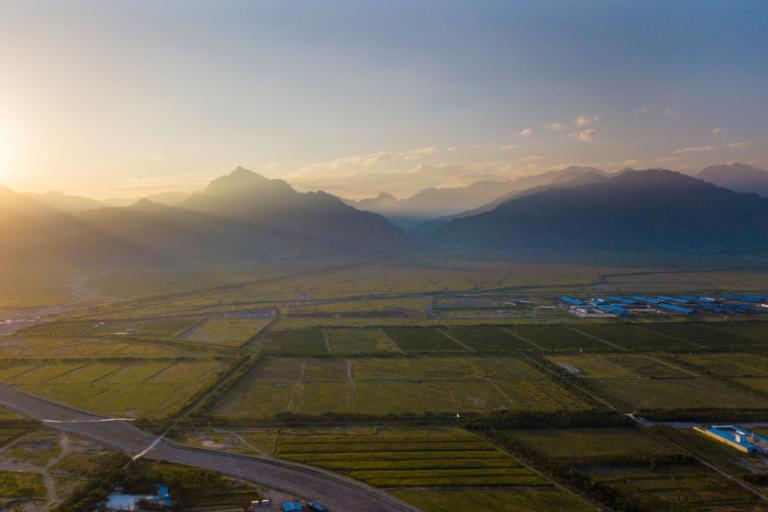
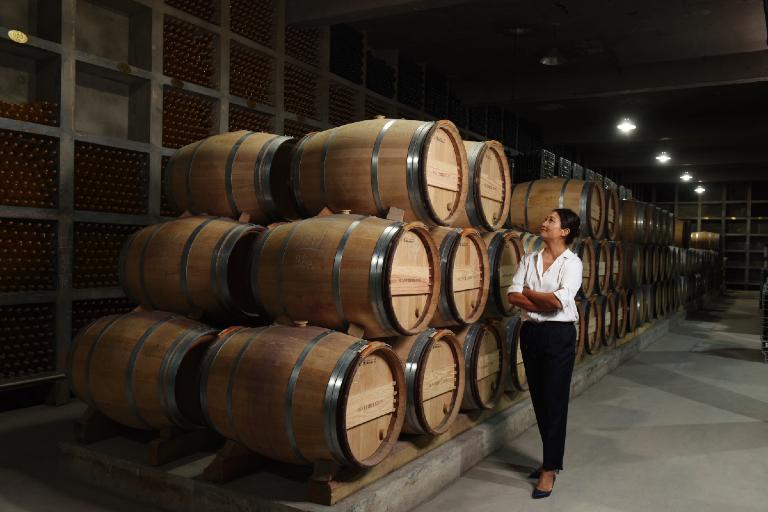
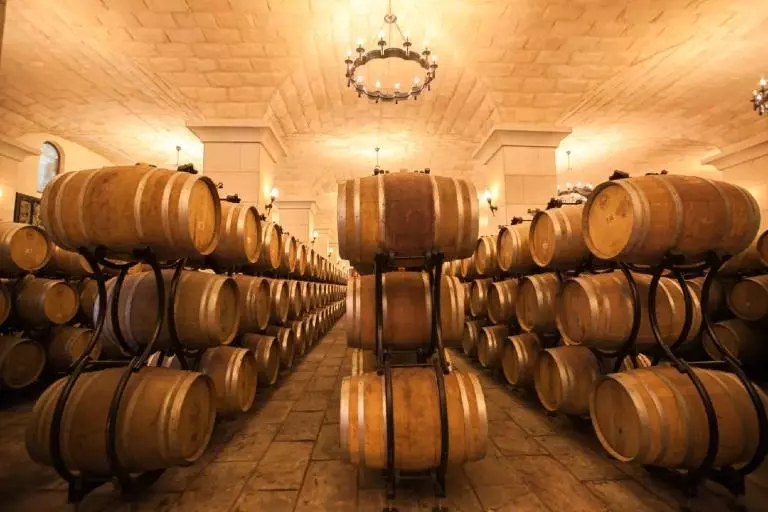
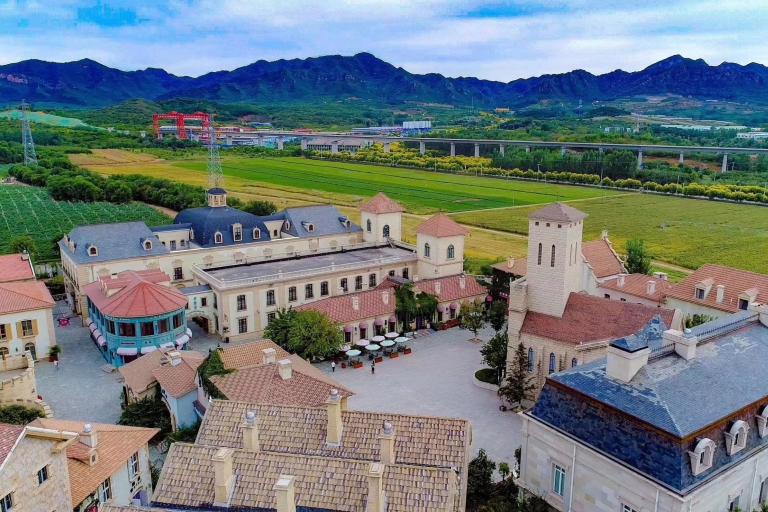


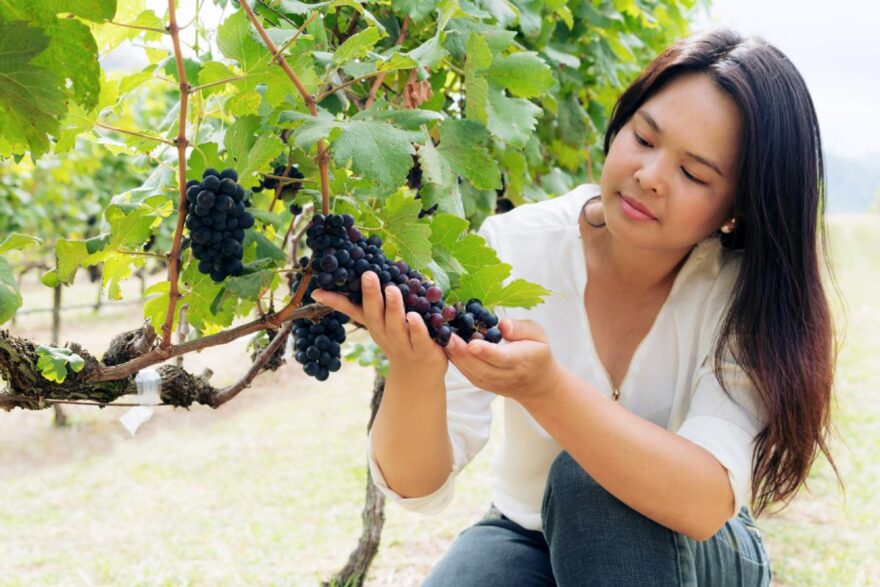
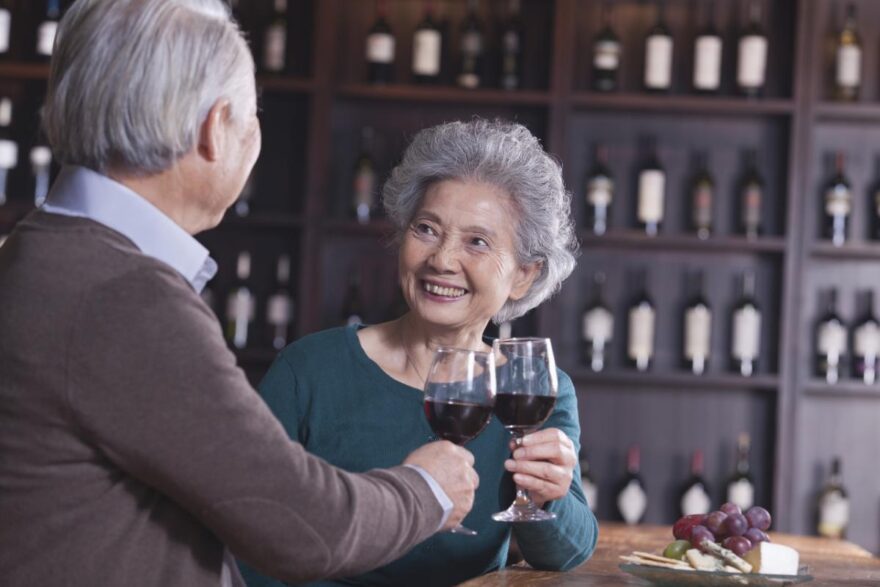
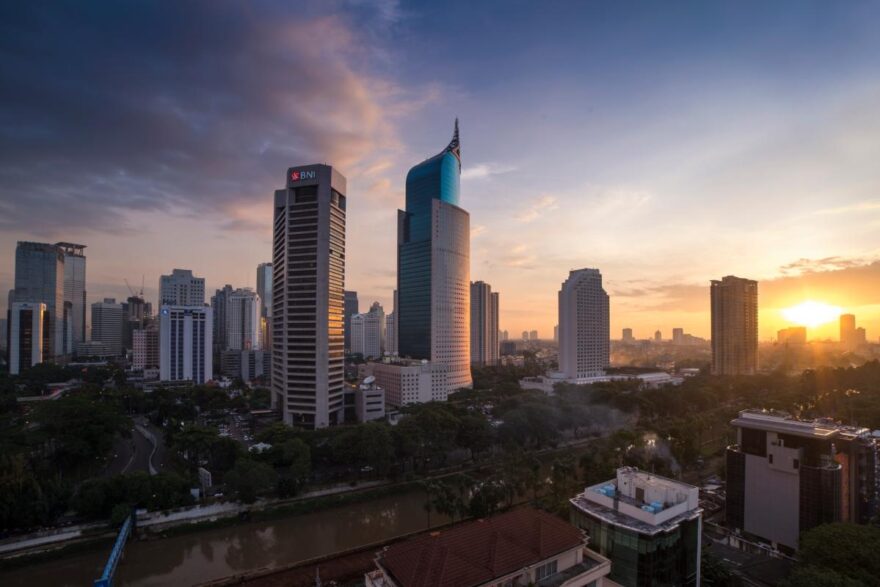
Definitely have some of these wineries in my bucketlist for my next visit to China.
so wish i can start my own brand & shop that will sell & taste new wines from china , as im in south africa in east london.
would love to have my own thing.
i have a dream that one day will have my shop for people to come and taste , buy wine at my shop